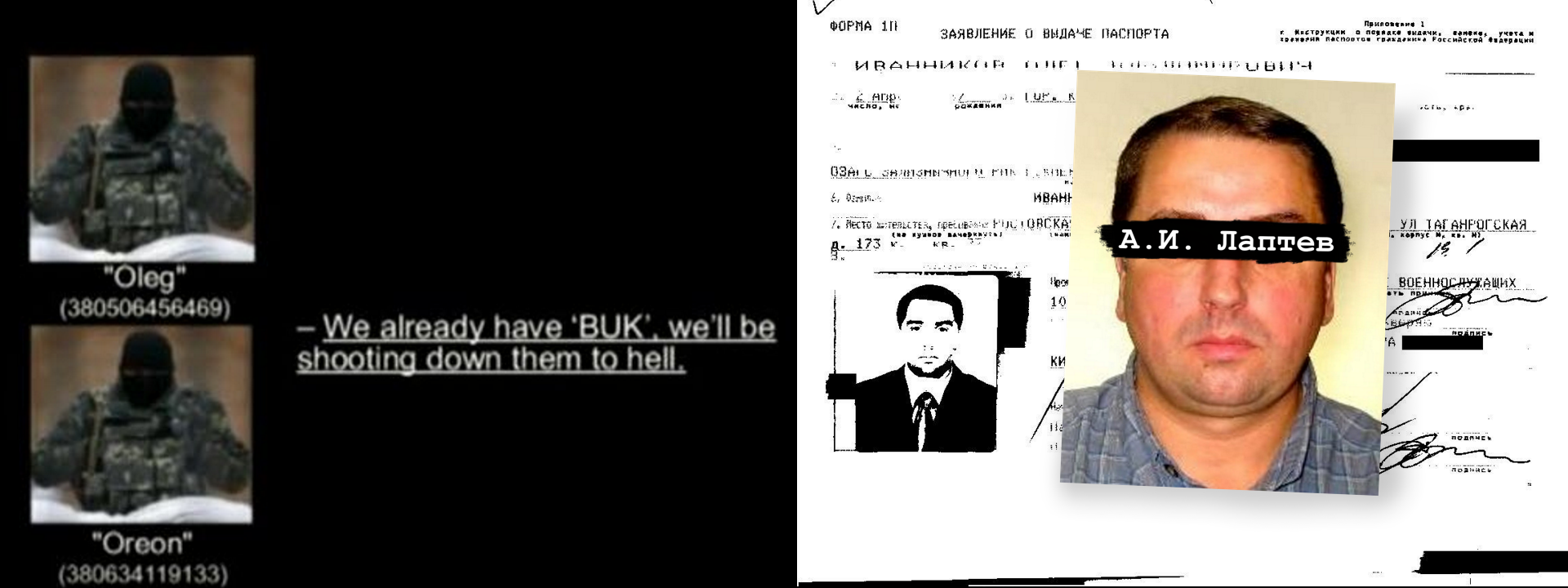#PutinAtWar: Background on Central Person in MH17 Downing
Bellingcat investigation reveals the secret identity of GRU officer “Oleg Ivannikov” AKA “Orion”
#PutinAtWar: Background on Central Person in MH17 Downing

Bellingcat investigation reveals the secret identity of GRU officer “Oleg Ivannikov” AKA “Orion”

This article builds off the research carried out by our partners at the Bellingcat Investigation Team. Following the shootdown of MH17, Bellingcat has worked tirelessly to uncover the truth about the incident. As part of this effort, Bellingcat released a report today unmasking a Russian military intelligence officer implicated in organizing armed activities in Eastern Ukraine, including the Russian Buk-M1 that shot down MH17. Read their report here for the full information about the unmasking of Oleg Ivannikov.
Laptev — Ivannikov.
Andrey Ivanovich Laptev was Minister of Defense of the Russia-backed breakaway state of South Ossetia between 2006 and 2008, leaving office in March just before the outbreak of the Russo-Georgian August war. Laptev was replaced by Major-General Vasily Lunev and fell into relative obscurity since then. According to the Bellingcat investigation of the shootdown of Malaysian Airlines flight MH17, Laptev was an officer of the Russian General Staff’s Main Intelligence Directorate (GRU), who currently lives under the pseudonym Oleg Vladimirovich Ivannikov and played an instrumental role transporting the Buk-M1 air defense system that show down MH17.
The Dutch Joint Investigation Team (JIT) concluded on Thursday that the Buk launcher that shot down MH17 originated from Russia’s 57th Anti-Aircraft Missile Brigade. The findings of the Bellingcat investigation complement the work of the JIT in exposing the persons responsible.
South Ossetia 2004–08
Laptev was first documented in South Ossetia in 2004, working under the MoD staff as Chairman of the South Ossetian Security Council.
On December 11, 2006, Laptev was promoted from a non-descript staff position on the South Ossetian Ministry of Defense to being Minister of Defense. Despite remaining in office for about a year and a half, no public imagery has been found of Laptev as minister of defense. It was no secret that Laptev had come to South Ossetia from Russia, in fact foreign Ministers of Defense were the norm in South Ossetia.
Although Laptev was not Minister of Defense during the August 2008 war, he was still viewed as an influential character in building the breakaway republic’s military. In one interview, then-president Eduard Kokoity claimed that Laptev “created the very backbone of the armed forces”, which would later engage with Georgian forces with significant Russian support.
After returning to Moscow, Laptev remained involved in South Ossetian politics under his South Ossetian pseudonym but was also highly engaged with the region in his capacity of Ivannikov. In a 2012 interview, Laptev publicly endorsed David Sanakoyev in his presidential candidacy. Sanakoyev did not end up becoming president of South Ossetia but served as Minister of Foreign Affairs between 2012 and 2015. South Ossetia was one of the first entities to recognize and establish “diplomatic relations” with separatists in eastern Ukraine.
PhD Thesis
After leaving South Ossetia for Moscow, Laptev went on to pursue a PhD as a candidate of philosophy at the Southern Federal University of Rostov-on-Don under the pseudonym “Oleg Ivannikov”. While not publicly available, Bellingcat obtained a copy of the thesis.
Titled “The Complex Nature of Information War in the Caucasus: Socio-Philosophical Aspects”, the thesis was generally unhelpful in understanding how Ivannikov operated during his time as Andrey Laptev, but nonetheless offered some perspective into the mentality that drove his actions. The thesis was almost a caricature of its time and place, and included plentiful references to effects-based operations, which then-U.S. Joint Forces Commander Mattis considered an unhelpful approach [pdf], and Network-Centric Warfare. Several other references were made to “the great game” in the Caucasus between the west and Russia, as well as mentions of George Soros in the context of information war. Most telling, perhaps, was the seemingly inescapable Clausewitz quote that war is politics by other means, from which Ivannikov concluded that politics must thus also be war by other means.
Positions in Academia
After writing his thesis, Ivannikov became director of the Russia-Caucasus Research Center of the International Institute of Newly Established States in Moscow in 2012. Here, Ivannikov was director at the institute’s Caucasus center, and published a number of articles on the region, among others. Bellingcat’s investigative team noticed that all articles authored by Ivannikov had been stripped from the institute’s site but had managed to create an archived version of the website prior to this happening. Under the Laptev pseudonym, Ivannikov is said to have founded the research institute “Center for Eurasian Studies” in the South Ossetian capital of Tshkinvali.
Conclusion
Beyond his implication in the shoot-down of MH17, Ivannikov’s roles in the Donbas and South Ossetia serve as reminders of the central role that Russian military intelligence plays in propping up separatist states in the post-soviet space. Ivannikov’s seemingly close relationship with the former South Ossetian Minister of Foreign Affairs could have been a facilitating factor in the unusually active relationship between the two de-facto states.
Follow along for more in-depth analysis from our #DigitalSherlocks.

